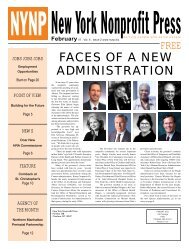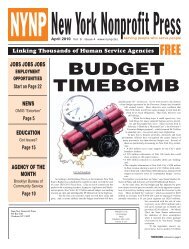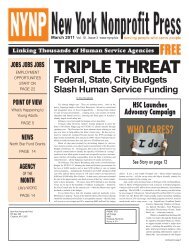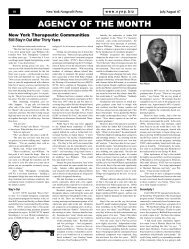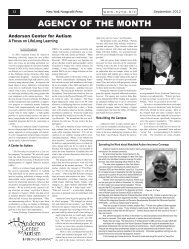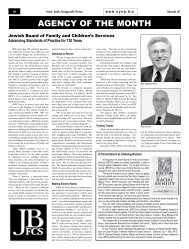September Edition 2004 - New York Nonprofit Press
September Edition 2004 - New York Nonprofit Press
September Edition 2004 - New York Nonprofit Press
Create successful ePaper yourself
Turn your PDF publications into a flip-book with our unique Google optimized e-Paper software.
16 <strong>New</strong> <strong>York</strong> <strong>Nonprofit</strong> <strong>Press</strong> www.nynp.biz <strong>September</strong> <strong>2004</strong><br />
FINANCE<br />
A Ten Point Checklist to Evaluate<br />
Your Financial Management<br />
Unfortunately, it is not uncommon to read about financial<br />
failings at even well known and well established nonprofits. At<br />
these times, a question often arises: how do board members<br />
and executive directors, many of whom do not have financial<br />
backgrounds, determine if their finances are managed well. Finances<br />
are, after all, the life-blood of nonprofits.<br />
I believe that boards and CEOs can quickly assess the<br />
strength of their agency’s financial management by rating the<br />
efficiency of their accounting or finance department. While this<br />
simple checklist may not reveal deep seated financial flaws i.e.<br />
structural deficits or revenue risks, it is based on the truism that<br />
how an accounting or finance department functions determines<br />
how well their finances are managed.<br />
Sanjay Shah<br />
HOW DOES YOUR AGENCY STACK UP?<br />
❑ 1. Does your accounting department give you timely and accurate “bird’s eye view”<br />
reports every month?<br />
These should be 3 or 4 pages long, with the first page comparing monthly<br />
and year-to-date operations with budget targets, followed by “drilleddown”<br />
reports of either groups of programs or funds and a page of notes<br />
explaining the “variances.”<br />
❑ 2. Are these reports automated, coming right out of the accounting system?<br />
In many instances, accounting/finance personnel spend inordinate<br />
amounts of time preparing reports because their accounting systems don’t<br />
or can’t produce them in the format they or their board want. Besides the<br />
time savings, reports coming right from accounting systems help to assure<br />
the integrity of the numbers.<br />
❑ 3. Does your accounting department prepare monthly reports within 10 days after<br />
a month ends?<br />
Unless there is a specific and compelling reason for delays, your accounting/finance<br />
department should be able to give “timely” reports. Regular<br />
delays of more than 10 days may be due to problems with basic “processing”<br />
functions i.e. payroll, accounts payable, etc.<br />
❑ 4. Do the reports prepared by your accounting department give a clear sense of<br />
what’s going on and where the problems lie?<br />
Clarity & brevity, as opposed to volumes of tiny details, are more important,<br />
especially when it comes to reports for the board of directors.<br />
The reports should show overall results (surplus or deficit), where the<br />
problems lie – i.e. Program A caused 71% of deficit because of higher<br />
salaries (39%), rent (11%) & lower revenue (21%) - and what management<br />
intends to do about it. More often, the reports and discussions get<br />
bogged down in questions like “Why is our telephone bill $200 higher<br />
than last month?” and miss the big picture.<br />
❑ 5.<br />
Does your accounting department provide quick answers to your questions?<br />
Ideally, they should anticipate the questions and provide explanations.<br />
However, if they take 2 hours to answer a question like “how did we do<br />
in Program A for July compared with last year?”, then you have a problem<br />
❑ 6. Does the accounting department provide a Statement of Activities (Revenue<br />
& Expense Report) and a Statement of Position (Balance Sheet) at the same time?<br />
A well-run accounting/finance department is up-to-date with all processing<br />
functions, monthly closings, adjustments, bank reconciliations,<br />
etc., essential to producing Statement of Activities & Statement of Position<br />
reports simultaneously. A department that is on top of their financial<br />
statements is also likely to be on top of financial matters concerning<br />
their organization.<br />
❑ 7. Does your accounting department provide you cash flow projections and analyses<br />
of accounts payable and receivable?<br />
Many nonprofits struggle with cash flow and one way of managing it is<br />
to have regularly updated cash flow projections so you can appropriately<br />
manage accounts receivable, accounts payable and working capital<br />
needs. Cash flow projections should be based on historical data and adjusted<br />
for the knowledge about current events.<br />
❑ 8. Can your accounting department complete an external CPA audit in 3 months<br />
after a fiscal year ends and do your final audited numbers differ substantially<br />
from the unaudited numbers?<br />
An independent CPA audit is the ultimate test of your financial reports.<br />
How quickly is your accounting department ready to meet with outside<br />
auditors? Not many nonprofits of any size actually complete a CPA audit<br />
within three months, but a well-functioning department should be<br />
prepared for one at that point. Also, while there is always some variation<br />
between internal financial reports and final audited results, substantial<br />
differences are a sign of trouble.<br />
❑ 9. Does your accounting department provide you with financial projections – for the<br />
current year as well as next year?<br />
An ability to create financial projections, depending on the complexity of<br />
the operations, may require financial modeling and/or advanced<br />
spreadsheet skills. The payoff is an ability to manage your finance<br />
“proactively.”<br />
❑ 10. Does your accounting department follow FASB 116 requirements regarding<br />
unrestricted, temporarily restricted and permanently restricted funds in recording<br />
all receipts?<br />
It is extremely important to delineate unrestricted funds from temporarily<br />
and permanently restricted funds at the transaction level, for the simple<br />
reason that nonprofits have discretion over where, when & how they<br />
can spend these funds and they should correctly record and track these<br />
receipts.<br />
CHECK YOUR RESULTS:<br />
Yes to 5 or less – Needs significant improvements<br />
Yes to 6 or 7 – Needs some improvements<br />
Yes to 8 or more – Needs marginal improvements<br />
What can you expect if you meet all or 8 or more tests? Four major benefits:<br />
a) Good financial management and planning<br />
b) Well-educated decisions to meet your short-term and long-term goals<br />
c) Proactive management to avert impending problems<br />
d) Efficient use of all of your resources – time, people, and money<br />
What do you need to pass these tests? Three things as follows:<br />
• Clearly defined and automated processes with checks and balances<br />
•Well implemented systems to meet your organization’s needs & goals<br />
•Trained staff – both in the processes and the systems, and knowledgeable in financial/accounting<br />
matters<br />
Sanjay Shah is the President of Paragon Management Group. He has worked as CFO and<br />
consultant for many large and small nonprofits. He can be reached at sshah@paragon.mgt.com



